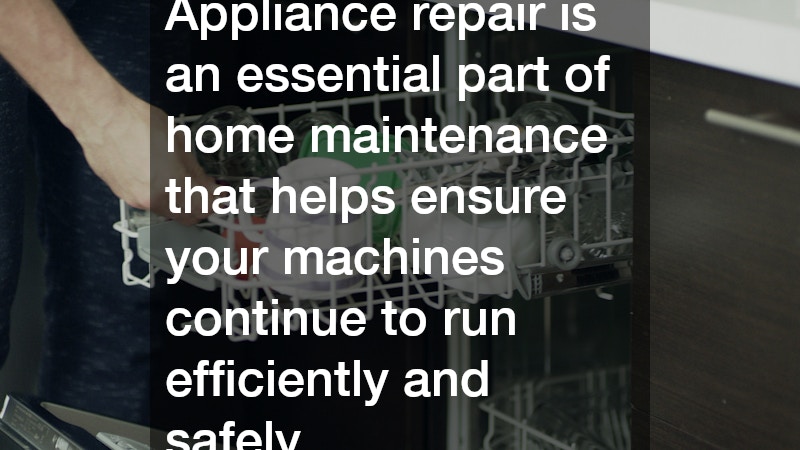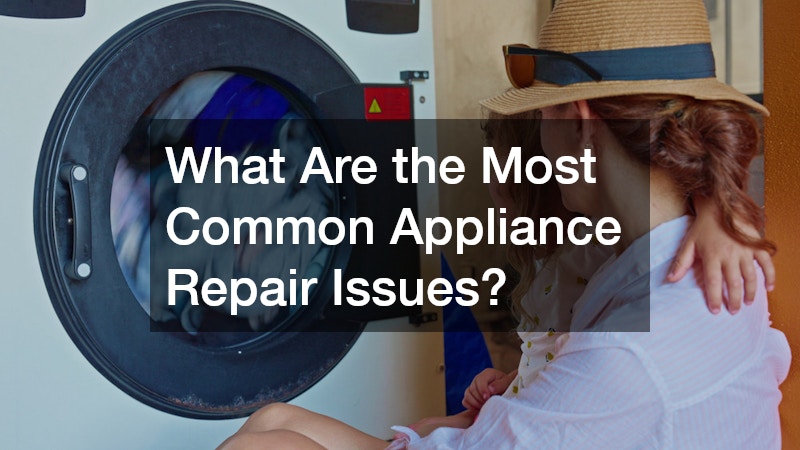Household appliances are essential to the daily convenience and functionality of modern living. From washing machines and fridges to dishwashers and ovens, they keep our homes running smoothly. However, when these machines break down, they can disrupt routines and cause significant stress. Understanding the most common appliance repair issues can help homeowners recognise early warning signs, take preventive action, and avoid more costly repairs or replacements in the future.
Washing Machines That Won’t Spin or Drain
A frequently encountered problem in many households is a washing machine that refuses to spin or drain properly. This can be due to a variety of causes, such as an unbalanced load, a clogged drain hose, or a faulty pump.
In some cases, worn belts or malfunctioning lid switches may be to blame. It’s important to troubleshoot these issues quickly, as standing water can lead to mould growth and damage to the machine’s internal components. If basic fixes do not resolve the issue, a professional appliance repair technician can identify and replace the defective part.
Fridges Not Cooling Properly
When a refrigerator is no longer keeping food cold, it becomes an urgent issue. One of the most common reasons is a problem with the condenser coils, which can become dirty and inefficient over time. Another possibility is a malfunctioning thermostat or compressor. If the fridge is making unusual noises or the freezer is too frosty while the fridge compartment remains warm, this indicates a likely imbalance in the temperature regulation system. Appliance repair for this issue often involves inspecting and cleaning the coils, checking the fan motors, and possibly replacing the temperature control board or compressor.
Ovens & Stoves That Won’t Heat
Cooking appliances like ovens and stovetops are central to preparing meals, so any failure to heat can cause considerable inconvenience. For electric ovens, a faulty heating element or temperature sensor could be responsible. In gas ovens, the problem might be a defective igniter or blocked burner. If the appliance has a digital control panel, software malfunctions or power supply issues might also be the cause. While some basic checks can be performed—such as resetting the circuit breaker or inspecting for obvious signs of wear—complex repairs should be handled by a qualified appliance repair professional to ensure safety and compliance with electrical standards.
Dishwashers Not Cleaning Dishes Properly
A dishwasher that runs but leaves dishes dirty is another common frustration. This can stem from blocked spray arms, a malfunctioning water inlet valve, or insufficient water temperature. Sometimes, detergent residue or hard water build-up can impair the machine’s performance. If dishes are emerging cloudy or with food remnants still attached, a deep internal clean may be needed, or it could be time to inspect the pump and filter system. Regular maintenance, such as cleaning the filters and using the right detergent, can go a long way in preventing the need for appliance repair.
Dryers That Won’t Heat or Tumble
Dryers that fail to heat or tumble are inconvenient and may also pose fire risks if left unchecked. A lack of heat might point to a blown thermal fuse, a faulty heating element, or a thermostat failure. If the drum won’t spin, the issue could lie with a broken belt, worn motor, or defective start switch. Another red flag is excessive noise or vibration, which could indicate worn drum rollers or bearings. A professional technician can carry out diagnostic tests to identify the underlying issue and recommend the right appliance repair solution, often saving the need for a complete replacement.
Microwaves with Power or Door Issues
Microwaves that won’t start, heat food unevenly, or have faulty door mechanisms are often the result of a malfunctioning door switch or magnetron. Because these appliances involve high-voltage components, they can be dangerous to disassemble without proper training. A power issue might be traced to a blown fuse, tripped circuit breaker, or even internal wiring problems. For safety reasons, it is always best to rely on an experienced appliance repair specialist to address microwave faults.
Preventing Common Appliance Problems
While appliance failures can sometimes be unpredictable, regular maintenance is key to preventing many of these issues. Keeping appliances clean, following manufacturer guidelines for use, and having periodic check-ups can extend their lifespan. Avoid overloading washing machines and dryers, clean refrigerator coils annually, and descale dishwashers and coffee machines as needed. These simple steps can help catch minor problems before they escalate into costly repairs or replacements.
When to Call in the Experts
Although some appliance malfunctions can be resolved through basic troubleshooting, others require professional assessment. Repeated problems, strange noises, electrical smells, or inconsistent performance are all signs that appliance repair is warranted. Attempting to fix complex issues without the right tools or expertise can worsen the problem or create safety hazards. Certified technicians not only have the knowledge to diagnose the root cause but also carry the correct replacement parts and follow safe repair practices.
Appliance repair is an essential part of home maintenance that helps ensure your machines continue to run efficiently and safely. When problems do arise, acting quickly and relying on professional services where needed can save both time and money. By understanding what causes these common appliance faults, homeowners can better manage their household equipment and enjoy peace of mind knowing they’re prepared for any unexpected breakdowns.



